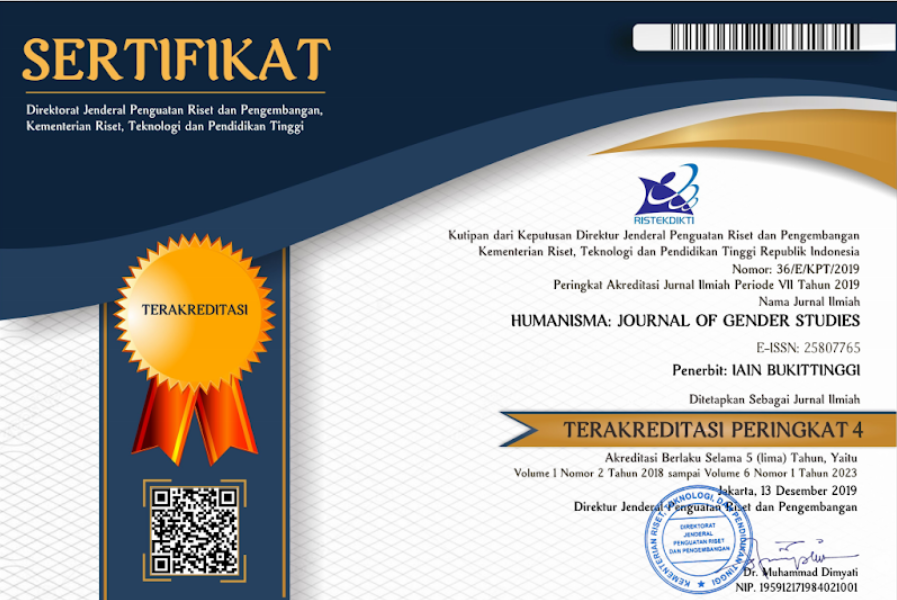Perlawanan Perempuan Adat Wana Posangke dalam Mempertahankan Identitas Kultural
DOI:
https://doi.org/10.30983/humanisme.v4i1.3161Keywords:
Thestruggle of indigenous people, Cultural Identity, Wana PasongkeAbstract
References
Abna, B., & Sulaiman, D. R. (2007). Pengelolaan Tanah Negara dan Tanah Ulayat. Lembaga Kerapatan Adat Alam Minangkabau (LKAAM).
Atkinson, J. M. (1993). Religion and The Wana of Sulawesi. In The Real and Imagined Role of Culture in Development, Case Studies From Indonesia (M. R. Dove (ed.)). University of Hawaii Press.
Gumiandari, S., & Nafi’a, I. (2019). Women in the Identity Crisis of Feminism: A Critical Analysis on Gender Movement Based on Islamic Psychology Perspective. 03(01). https:// ejournal.iainbukittinggi.ac.id/index.php/psga/article/view/1167/pdf
Gunawan Wiradi. (2009). Seluk Beluk Masalah Agraria Reforma Agraria dan Penelitian Agraria. STPN Press.
Hauser-Schaubli, B. (2013). Adat and Indogeneity in Indonesia, Culture and Entitlements between Heterenomy and Self-Ascription. Universitatsverlag Gottingen.
Jenny Edkins, dan N. V. W. (Ed. ). (2013). Teori-teori Kritis. Menantang Pandangan Utama Studi Politik Internasional. Pustaka Pelajar.
Kusumawardhani, L. (2016). Informasi 521 Kawasan Konservasi Region Kalimantan dan Sulawesi. Kementerian Lingkungan Hidup dan Kehutanan Republik Indonesia.
Luthfi, A. N., Tohari, A., & Nugroho, T. (2010). Pemikiran Agraria Bulaksumur. STPN Press.
Matthew B Miles, A. Michael Huberman, J. S. (2014). Qualitative Data Analyis: A Methods source book (Third Edit). SAGE Publications Inc.
Norman K. Densin, Y. S. L. (2005). The Sage Handbook of Qualitative Research. Sage Publications,.
Nurkamilah, C. (2018). Etika Lingkungan Dan Implementasinya Dalam Pemeliharaan Lingkungan Alam Pada Masyarakat Kampung Naga. Religious: Jurnal Studi Agama-Agama Dan Lintas Budaya, 2(2), 136–148. https://doi.org/10.15575/rjsalb.v2i2.3102
Polanyi, K. (2003). Transformasi Besar: Asal Usul Politik dan Ekonomi Zaman Sekarang. Pustaka Pelajar.
Rachman, N. F. (2016). Bersaksi Untuk Pembaruan Agraria: dari Tuntutan Lokal Hingga Kecenderungan Global (Kedua). INSISTPress.
Reflita, R. (2015). Eksploitasi Alam dan Perusakan Lingkungan (Istinbath Hukum Atas Ayat-Ayat Lingkungan). Substantia, 17(2), 147–158. http://www.substantia jurnal.org/index.php/subs/article/view/143
Situmorang, A. W. (2013). Gerakan Sosial: Teori dan Praktik. Pustaka Pelajar.
Susilo, R. K. D. (2009). Sosiologi Lingkungan. Rajawali Pers.
Yunarti, S. (2018). Inisiasi Posisi dan Peran Perempuan dalam Kontek Budaya Minangkabau. 2(1). https://ejournal. iainbukittinggi.ac.id/index.php/psga/article/view/808/pdf
Zaiful. (2017). Gerakan Penyelamatan Lingkungan Masyarakat Adat Tau Taa Wana. Majalah SILO. Edisi 74. https://www.ymp.or.id/silo-74-rekam-rasa-orang-wana/
Undang-Undang Dasar Negara Republik Indonesia Tahun 1945
Undang-undang Nomor 5 Tahun 1960 tentang Peraturan Dasar Pokok-pokok Agraria (Lembaran Negara Republik Indonesia Tahun 1960 Nomor 104; Tambahan Lembaran Negara Nomor 2034)
Downloads
Additional Files
Published
How to Cite
Issue
Section
Citation Check
License
Authors who publish with this journal agree to the following terms:
- Authors retain copyright and grant the journal right of first publication with the work simultaneously licensed under a Creative Commons Attribution-ShareAlike 4.0. that allows others to share the work with an acknowledgment of the work's authorship and initial publication in this journal.
- Authors are able to enter into separate, additional contractual arrangements for the non-exclusive distribution of the journal's published version of the work (e.g., post it to an institutional repository or publish it in a book), with an acknowledgment of its initial publication in this journal.
- Authors are permitted and encouraged to post their work online (e.g., in institutional repositories or on their website) prior to and during the submission process, as it can lead to productive exchanges, as well as earlier and greater citation of published work (See The Effect of Open Access).



